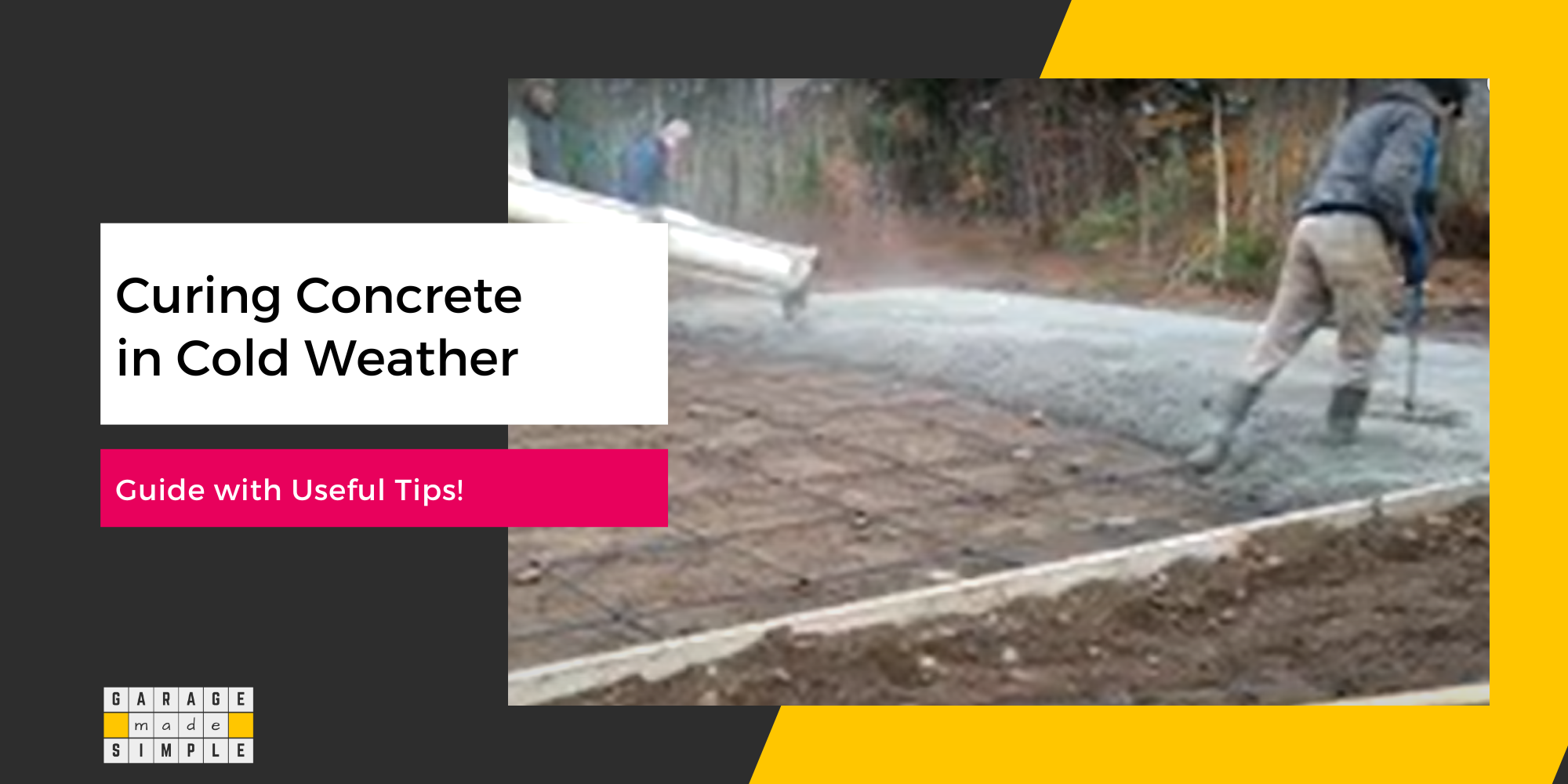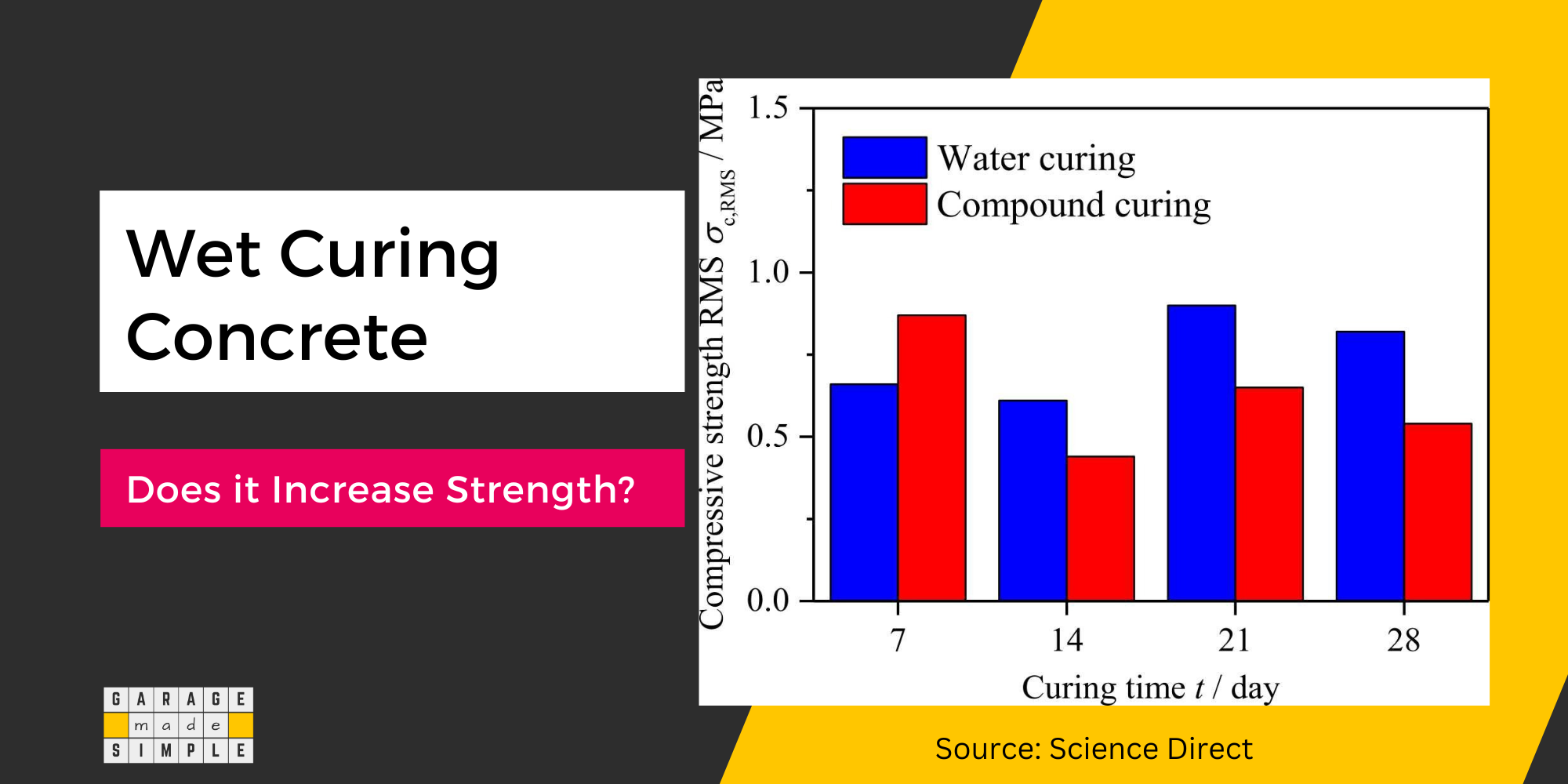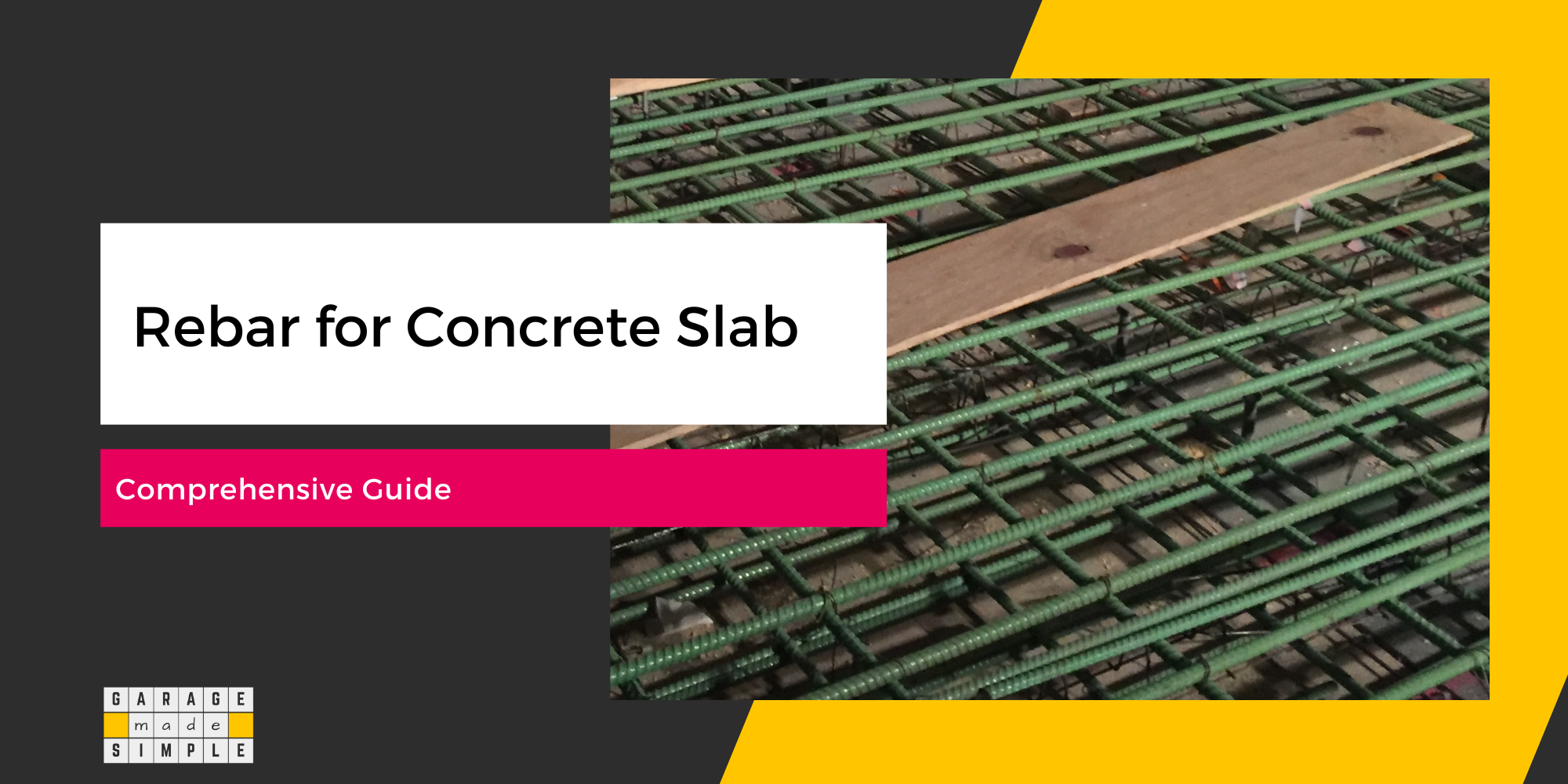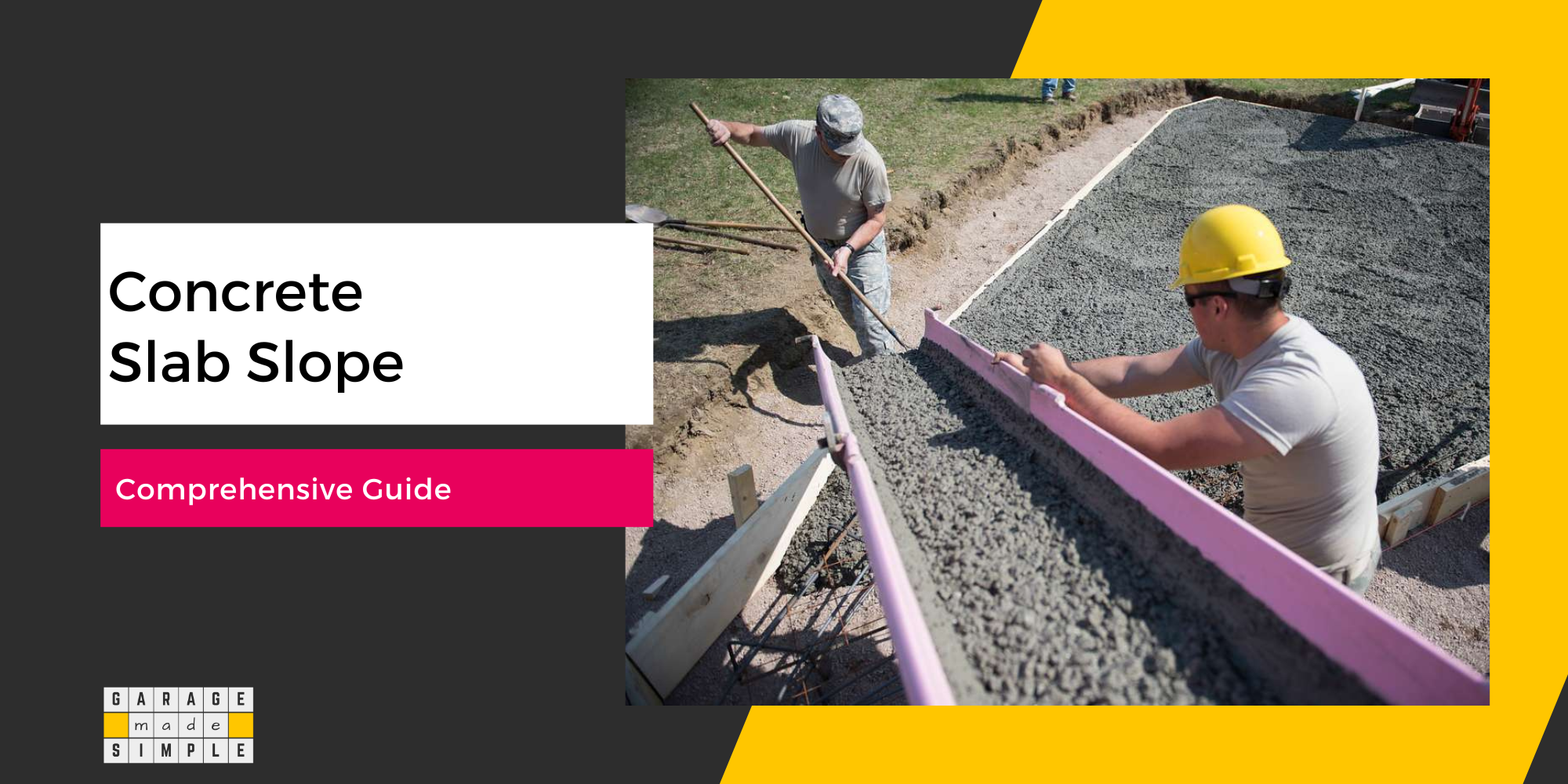Best Concrete Mix For Garage Floor: 6 Factors to Keep an Eye On!
garagemadesimple.com is a participant in the Amazon Services LLC Associates Program, an affiliate advertising program designed to provide a means for sites to earn advertising fees by advertising and linking to Amazon.com . The website is also an affiliate of a few other brands.
What Concrete Mix Is Best for Garage Floor?
Planning on building a new garage or redoing the existing garage floor? You need to make sure that you use the best concrete mix for a garage floor. All concrete mixes are not the same as they are designed for different loads and weather conditions.
So, what’s the best concrete mix for garage floor?
The best concrete mix for garage floor should meet the 2021 International Residential Code (IRC). The compressive strength of the concrete slab should be 2500-3500 psi depending on the garage location on the weathering potential map.
However, practically speaking, the best concrete mix for garage floor should have compressive strength of 3500 psi. The concrete mix ratio required for this is cement: 1 part, sand: 2.5 part, aggregates: 3 part and water: 0.5 part.
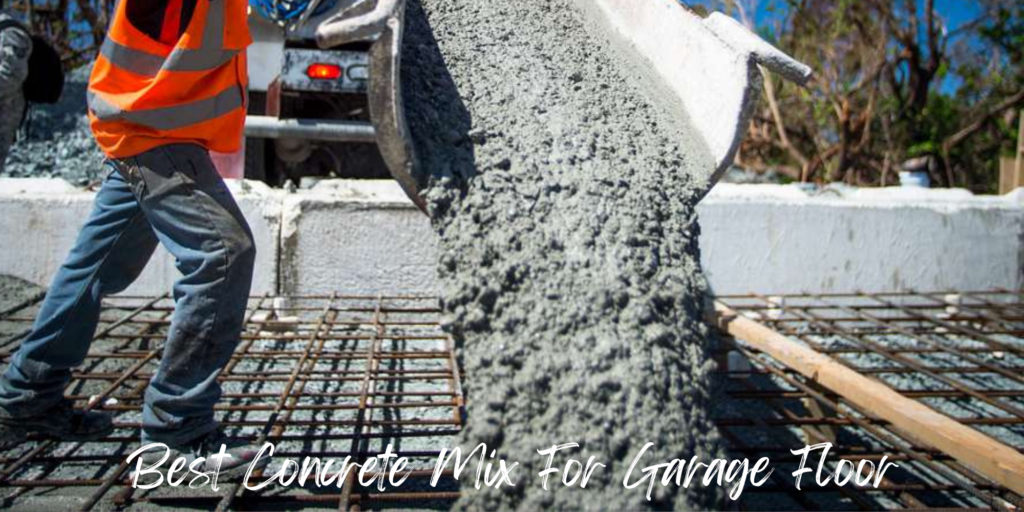
The compressive strength of the concrete slab will depend mostly on the following six factors, related to the concrete mix for for the garage floor:
- Water – Cement Ratio
- Cement – Aggregate Ratio
- Quality of Ingredients (Cement, Water, Aggregates etc.)
- Concrete Additives
- Compaction
- Curing Conditions
In this post I explain about concrete mix and the role each of the six factors plays. I also write about the latest building code for garage concrete floors.
What is Concrete Mix Composed Of?
The concrete mix is a slurry that has three main ingredients; cement, water and aggregates. In addition it may have some additives and fibers to give special properties.
Cement
Cement is not a naturally occurring material. Instead, cement is manufactured through a series of chemical reactions involving 8 ingredients. Of these 3 ingredients form the bulk (80-98%). These are:
- Limestone (60-65%)
- Silica (17-25%)
- Alumina (3-8%)
It is not surprising that most cement plants are located in close proximity to limestone deposits.
The use of quality cement from a reputed manufacturer in the concrete mix is of paramount importance to ensure you have the best concrete mix for your garage floor.
Look out for the date of manufacture as old cement will not have the same bond strength as new.
Water
Water is of course a naturally occurring substance and there is an abundant supply of it. All you have to do is make sure that the water used in making concrete is not contaminated with any chemicals that may degrade the concrete performance.
Water fit for human consumption, that is drinkable or potable water is ideal for making a concrete mix. If the water is potable, no further testing is required.
Non-potable water can also be used for making concrete provided:
- pH Level of the water is within 6.0 and 8.0
- harmful solids content (ppm) is below minimum acceptable levels
Sea water or brackish water will certainly not meet the above specifications.
On the other hand, wash water from concrete mix plants is acceptable as the solids in the water are obviously not harmful to concrete performance.
Aggregates
Gravel or crushed stone are used as aggregates in a concrete mix. Synthetic aggregates can also be used. Aggregates are the largest component of concrete mix. Aggregates must be chosen with care as they play a vital role in providing strength to concrete.
Aggregate used in concrete mix for a garage floor should conform to following guidelines:
- Use coarse aggregates. (Size range ¼” to ¾” is best). Use a mix rather than all aggregates of the same size. This will reduce void spaces
- Rough texture is better as it creates a better bond
- Use hard, strong, non-flaky, chemically inert, and non-porous aggregates
- Ensure aggregates are clean. Have them pressure washed before putting in the concrete mix in case they are coated with dirt or dust
The Concrete Mix
“.. is about 10 to 15 percent cement, 60 to 75 percent aggregate and 15 to 20 percent water. Entrained air in many concrete mixes may also take up another 5 to 8 percent.”
Source: The Portland Cement Association
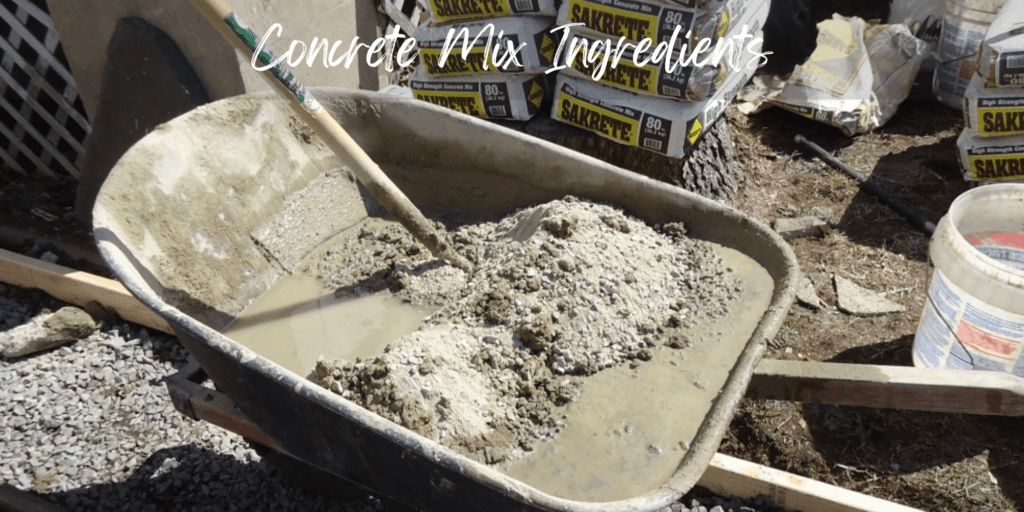
What Factors of Concrete Mix for Garage Floor Affect Strength?
The concrete mix is a slurry and can be poured into a garage floor slab mainly because of the water and cement paste. Water and cement are essential in concrete mix but the ratios in which they are added influences the ultimate compressive strength. when the concrete hardens.
Strength of a building material is measured in PSI (pounds per square inch). This is the load the material, in this case concrete, can withstand before breaking or crumbling.
Compressive Strength is the ability of concrete to withstand a load that is pressing into the concrete. Concrete slabs, such as in garage floors have pretty high compressive strength.
Tensile strength, on the other hand, is the ability of concrete to resist breaking or cracking under tension. In simpler words, high tensile strength is flexibility and low tensile strength is brittleness.
Concrete with a compressive strength of 4000 psi may have tensile strength of just 400 psi.
The compressive strength of concrete depends on a six important factors.
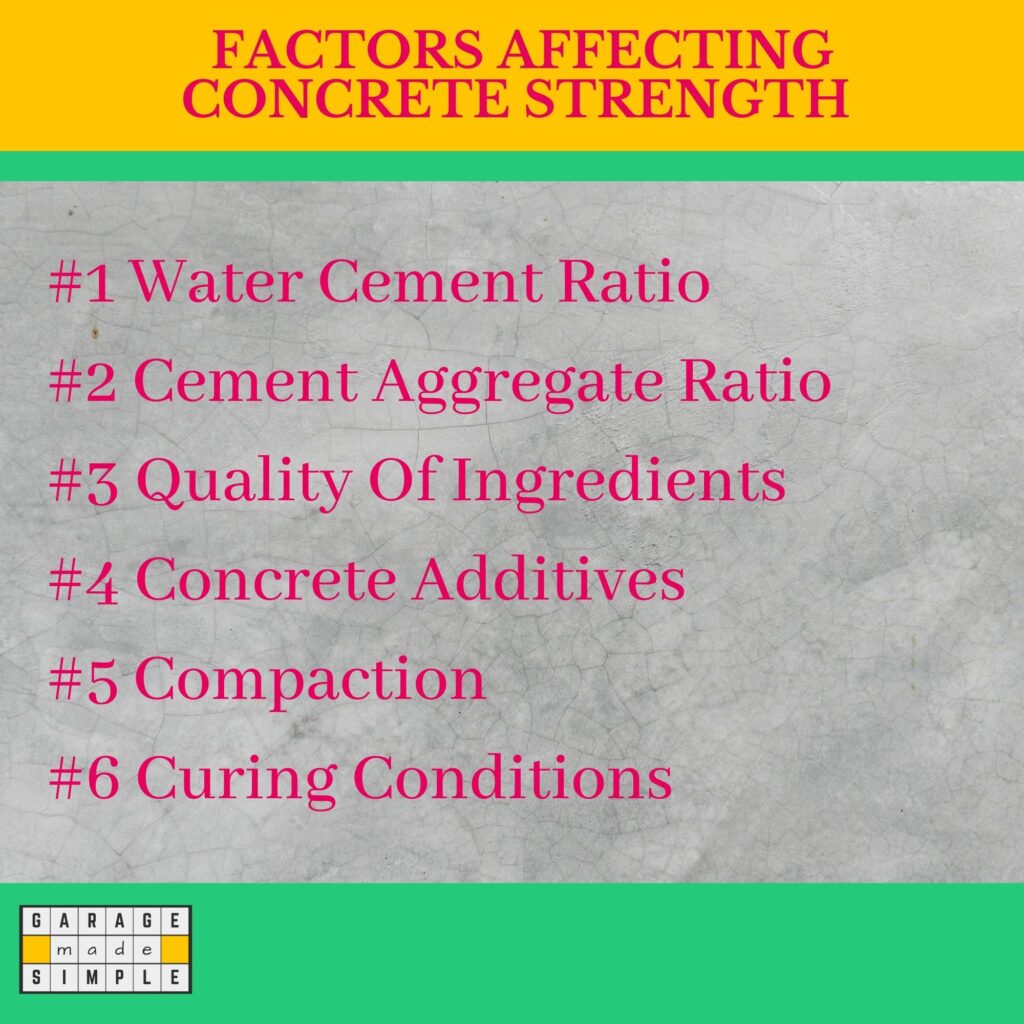
Factor #1: Water Cement Ratio
Water to Cement Ratio in the concrete mix is possibly the most important factor. As a thumb rule the compressive strength of concrete goes up as the water to cement ratio goes down.
“There’s an inverse relationship between the eventual compressive strength of concrete and the amount of water used in the mix—the higher the water-cement ratio, the lower the strength.”
CONCRETE CONSTRUCTION
2021 International Residential Code (IRC) specifies “Minimum Specified Compressive Strength” for garage floor slabs and recommends that the water to cement ratio be kept at 0.5 or lower. At this compressive strength level the garage slab can take all the load of your cars, furniture, what have you.
However, a garage slab that is 6″ or thicker will need rebar reinforcement for providing adequate tensile strength.
Factor #2: Cement Aggregate Ratio
To get the right concrete mix for a garage floor, you want the concrete mix to be workable so that it can be placed, but at the same time you want the concrete slab to have the recommended compression strength. You have to find the right ratio between the three ingredients.
For a desired workability, if the cement aggregate ratio can be increased without an increase in the water cement ratio then the concrete mix will result in a higher strength concrete floor.
Actually it is possible to increase the cement aggregate ratio such that the water cement ratio reduces without any adverse effect on workability.
So concrete mix designers have to find the sweet spot for
- Water Cement Ratio
- Cement Aggregate Ratio
- Concrete Mix Workability
- Concrete Compressive Strength
Factor #3: Quality of Ingredients
This is actually true for almost anything. The quality of the individual ingredients in any recipe has a direct bearing on the quality of the final dish. We all know that even a Michelin Star Chef can not make a great dish with sub standard ingredients.
Likewise in the case of concrete. The strength of the concrete will depend a lot on the three main ingredients of the concrete mix; cement, water and aggregates. I have already talked about these in the earlier section.
Factor #4: Concrete Additives
Specific concrete additives can be used to modify the properties of the concrete mix for a garage floor and that can increase the strength of the concrete.
Superplasticizers, for example, can be used to reduce water-cement ratio and yet allow the concrete mix to be workable. This will increase the concrete strength.
Factor #5: Compaction
As mentioned above, concrete also contains 5-8% of entrapped air. Air entrainment in the concrete mix is required for better workability. However,
An increase in the volume of air voids by 1% reduces the strength by 5%
STRUCTURAL GUIDE
Compaction is the process by which the entrapped air is released after the concrete mix has been poured. The voids are reduced and the poured concrete mix becomes denser, that is more compact.
Factor #6: Curing Conditions
In addition to factors pertaining to the concrete mix itself, the strength of the concrete is influenced by the curing time & process. Some key factors to keep in mind are:
- Curing Time – Concrete Mix for Garage Floor is considered as fully cured 28 days after placement (under normal environmental conditions). However, concrete continues to gain strength even after that. The incremental gain is small, though.
- Relative Humidity – Concrete gains strength through the hydration process. In case the humidity is low the concrete will dry out and the hydration process will stop. This is the reason concrete slabs need to be “ponded” during the curing period, especially in hot, dry zones.
Summary of 6 Important Factors that Result in the Best Concrete Mix For Garage Floor
| Factor | Description | Effect on Compressive Strength |
|---|---|---|
| Water-Cement Ratio | The ratio of water to cement in the concrete mix. | Inverse relationship. Lower water-cement ratio results in higher compressive strength. |
| Aggregate-Cement Ratio | The ratio of aggregates to cement in the concrete mix. | Inverse relationship. Lower aggregate-cement ratio results in higher compressive strength. |
| Quality of Ingredients | The quality of the individual ingredients in the concrete mix. | Direct relationship. Higher quality ingredients result in higher compressive strength. |
| Concrete Additives | The use of concrete additives in the concrete mix. | Can increase compressive strength. |
| Compaction | The process of compacting the concrete mix after it is poured. | Increases compressive strength by reducing voids. |
| Curing Conditions | The conditions under which the concrete mix is cured. | Longer curing time and higher humidity result in higher compressive strength. |
What Is the Best Concrete Mix Ratio for Concrete Garage Floor?
Most residential projects will use 3000 psi, 3500 psi or 4000 psi strength concrete. You may also use 2500 psi strength concrete where the loads are going to be really light.
Cement, sand and aggregates (such as crushed stone or gravel) along with water are the essential ingredients of any concrete. The concrete strength (in psi) is largely dictated by the concrete mix ratio of the 3 solid ingredients.
Concrete mix ratio is written as three numbers (for example 1:2:3). The first number is always cement. The second number is always sand. And the third number is always aggregates, such as gravel. The ratio of water is typically 0.5 or a bit less.
| Strength (psi) | Mix Ratio | Best For | Examples |
| 2,500 | 1:2:4 | Exteriors, Very Light Loads | Slabs for Sheds, Fence Posts, Walkways, Sidewalks, etc. |
| 3,000 | 1:3:3 | Interiors, Light Loads, Warm Climates | Steps, Counter Tops, Light Duty Beams & Columns, etc. |
| 3,500 | 1:2.5:3 | Interiors, Moderate Loads, Warm Climates | Residential Foundations & Footings, Garage Floors, Driveways in Warm Climates, Medium Duty Beams & Columns, etc. |
| 4,000 | 1:2.:3 | Exteriors, Heavy Loads, Cold Climates | Commercial Foundations & Footings, Commercial Space Floors, Driveways in Cold Climates, Patios & Decks, etc. |
From the above you can see that a concrete mix ratio of 1:2.5:3 is ideal for garage floors.
What is the Building Code for Concrete Mix for a Garage Floor?
The best concrete mix for garage floor is the one which has the correct concrete strength (psi).
The 2021 International Code Council (ICC) under Chapter 4, Section R402.2 and Table R402.2 lists the “Minimum Specified Compressive Strength” for garage floor slabs as:
| Weathering Potential | Compressive Strength (PSI) |
| Negligible | 2500 |
| Moderate | 3000 |
| Severe | 3500 |
For the Weathering Potential Map, you can check out Figure R301.2(3) of the IRC Code.
The code specifies that the maximum weight of fly ash, other pozzolans, silica fume, slag, or blended cements that is included in concrete mixtures for garage slabs and for exterior porches, carport slabs and steps that will be exposed to deicing chemicals shall not exceed the percentages of the total weight of cementitious materials specified in Section 19.3.3.4 of ACI 318.
Materials used to produce concrete and testing thereof shall comply with applicable standards listed in chapters 19 and 20 of ACI 318 or ACI 332. ACI is The American Concrete Institute.
Thank you very much for reading the post. I do hope you found it informative and useful.

